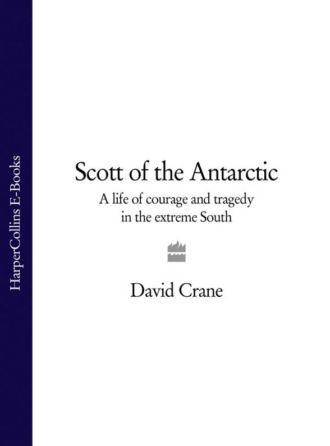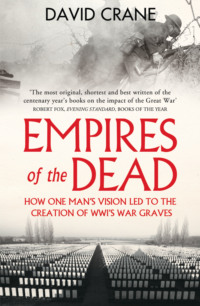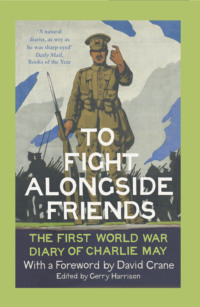
Полная версия
Scott of the Antarctic: A Life of Courage and Tragedy in the Extreme South
I got your letter this morning. Don’t blame yourself for what has happened, dear. Whatever we have cause to bless ourselves for, comes from you. He died like the true-hearted gentleman he was, but to you we owe the first lessons and example that made us gentlemen. This thing is most terrible to us all but it is no penalty for any act of yours …
In another matter I think I can afford a key other than your construction. Arch and I discussed his commissionership in all lights … and it was in regard to that, that his remark about leaving the artillery fell from him. Of this I am sure: he never regretted leaving Weymouth. Often and often when we were about there he said, ‘Well, old chap, this is all very narrow. I am awfully glad to have got away and seen the world a bit.’
Of course he loved his corps, but he never thought of it as a thing left behind and never was anything but glad to have left the dull routine of garrison duty.
I’m glad you got that nice letter from the Governor. Oh, my dear, it is something to know that everyone thought him a fine chap. His popularity was marvellous – he was such a fine gentleman. God bless you … Don’t be bitter, dear.
Your loving son
Con.
Hannah Scott had joined her daughters in Paris for six months, where they had gone to learn the dressmaking business, but with his father and Archie both dead, the financial burden for the family now fell on Scott, generously helped by Ettie’s new husband, the old Etonian, Unionist MP for Antrim and Parliamentary Secretary to the Admiralty, Willy Ellison-Macartney. ‘It seems to me to boil down to this,’ Scott had written to Ettie only weeks before Arch’s death:
that you & Willy are proposing to act in a most generous manner in the matter of the insurance; mother and the girls (especially the former) have been given new life by the proposal, (which if the business succeeds only moderately well will prove satisfactory all round … )
The saving of Mother’s money has an enormous effect on her peace of mind, as of course was to be expected. Therefore the future arrangements seem to be
You are insured for £1500 & pay something like £45 per annum
Arch pays to the ménage £120 & I some £70
The above £190 plus £30 from Outlands & £30 interest on Mother’s capital – £250 forms the home income
But of above is paid £40 as interest on loan £1000 leaving a net income of over £200
All expenses in connection with the business to come out of the £1000
Expenses of the Paris scheme [the dressmaking] to be debited on the £1000 advance.
It was a bathetic world for an ambitious young naval officer to find himself in, but Scott did not flinch. He had been prepared to sacrifice his career prospects in the immediate aftermath of the financial crash so that he could be at Devonport near his family, but with Archie dead and another £120 to be found, the only thing that concerned him now was promotion.
He might still sometimes wonder ‘whether the game is worth a candle’, but that was just idle talk. In letter after letter he comes back to the subject, and the endless speculation, manoeuvring and jobbing that the whole business of joining ‘the ranks of the advancers’ entailed: ‘if this can be worked I shall have little to grumble at’; ‘in with all the Flagship now’; ‘the Flag Captain is rather a friend of mine thanks to Ettie’; ‘Fraser would of course be only too delighted for me to succeed him’; ‘I can only hope to become known to their successors’; ‘I trust he will not forget me’.
Even before his father’s death he had been aiming high, applying for a berth in the senior Royal Yacht, Victoria & Albert, that would have put him at the heart of that unrivalled nexus of connections and patronage that effectively ran the service. ‘I want you to tell father the following about the Yacht of my year,’ he wrote home with that clear thinking and lack of resentment that always characterised his attitude to what he called the navy’s ‘much gilded’ youth: ‘I fear it will disappoint him – next to my name in the Navy List he will find Stanley – Michael Colme-Seymour & Goodenough – Stanley is a godson of the Queen, son of the Earl of Derby, a nice chap, popular and has war service (though only Egyptian) – Michael Seymour is of course the son of the Admiral which is saying a great deal as by the time of selection, his father will be at Portsmouth in command … Goodenough is very well connected, has been in the Yacht and in the Mediterranean Yacht, has many personal friends in high places, war service and altogether an excellent chance. Mike Seymour tells me all three people will try for the billet – so you see I fear there’s a very poor chance for me.’
Scott was right – Colme-Seymour got the post – but if he failed with the Yacht, he was more successful in his next ambition, joining the flagship of the Channel Fleet under the command of Prince Louis of Battenberg in July 1897. Among all the ships Scott served in, the Majestic and ‘Majestics’ would always hold a special place, and over the next three years he forged many of those key loyalties and friendships – Skelton, Barne, Evans, Egerton, Campbell – that would last his life. It was in Majestic, too, that Scott established himself beyond any question in his profession. He was not sure whether Prince Louis ‘liked’ him or not, ‘but at any rate’, he told his mother, ‘he thinks me able for my work which is the main thing’. ‘I think I said I would tell you about our doings at Palma Bay,’ he reported home in the same letter.
Well, they were most successful. We had a great time at our various exercises and everything went swimmingly; they left everything in my hands and I was a great man bossing the whole show. On the second day the Admiral came ashore and I showed him around the different arrangements – of course he knew very little about it, but by judiciously working his fads in, I think we made the whole thing popular … I am quite pleased with myself because it is the first time anything of the sort has been done in the Channel. On the last day we had a night attack of which I drew out the whole scheme; altogether I feel the torpedo department has asserted itself to some purpose. Now that Hickley leaves they are about to give me his work as well as my own – having no one else they can entrust it to. It suits me on the whole as having now established myself as a competent torpedo man, my policy is to show myself able to do the general duties … and I think there is no doubt I shall be able to manage the ‘Vernon’ next year, if I want it; it is satisfactory to think that promotion is more or less certain within something like a limited time and one joins the ranks of the advancers. Meanwhile I know you will like to hear that everything flourishes with my work here.
For all the cheery triumphalism of this letter – Scott was always wonderfully good in that way with his mother, endlessly ready to indulge maternal pride at the expense of his own innate hatred of ‘show’ – it touches on the one aspect of his career prospects that worried him. ‘Everything went well,’ he wrote home from Port Mahon again the following week, ‘and the Admiral was exceedingly nice about it so that I think my character as a torpedo man is established … But I have my eye also on another thing which is I fear a bit out of my reach. When Campbell [his future best man] is promoted I should like to be thought of as first lieutenant. They may not think me sufficiently good as a general service officer however, which worries me a bit, and since it would have to be done against the gunnery people I fear they won’t see it in the same light. However I shall wait my opportunity – and as Hickey’s work has come down on me as well, it may come that way.’
The danger of finding himself typecast as a technical specialist was no idle fear, but in the June of 1899 a change of captain and ship’s personnel in Majestic gave him the opportunity he wanted. ‘Egerton joined today,’ Scott wrote to his mother from Portsmouth on the twenty-eighth; ‘things have occurred as I expected and I am commander until de Chair arrives in England. He will be telegraphed for when Bradford is promoted but as he is at Zanzibar the journey will occupy some time, so here I am till the end of August or thereabouts – of course it is a wonderful opportunity but means work unending as my own torpedo work has to go on somehow.’
If Scott had found in Prince Louis a captain who thought of him first and foremost as a ‘first rate’ torpedo man, in George Egerton, his old commander in Vernon, he had secured himself a powerful patron and friend. In the Dixonian dichotomy of ‘autocrat’ and ‘authoritarian’ Egerton’s credentials would almost certainly put him on the ‘wrong’ side of the fence, but that did not stop him being in many ways the beau idéal of a Victorian naval officer, spirited, brave, charming well-connected and – best of all in a culture that raised chivalric effort over mere efficiency – an old ‘Arctic’ from the disastrous but heroic Nares expedition of 1875.
Scott was not the sort of young officer who would naturally impose himself, but as the man in Majestic who knew the ship better than anyone, he was well placed to make a mark with his new captain. By the middle of September de Chair had taken up his post as commander, but while he was still ‘green’ in the job he, too, inevitably depended ‘pretty much’ on Scott’s advice and knowledge. It was, as Scott said, hard work but a comfortable situation. ‘The new Captain is very pleased with the ship,’ he reported home the following month, ‘as I am the only link with the past, so to speak, and knowing the game from experience … my position is a very strong one.’
Strong as his position was, it is another remark of Scott’s, a chance comment from a diary fragment – ‘The naval officer should be provided by nature with an infinite capacity for patiently accepting disappointments’ – that probably more accurately reflects his mood at this time. ‘In 1899,’ Grace recalled, ‘coming home in H.M.S. Majestic he said he must look out for something to take him out of the general rut of the Navy, a service he was devoted to, but he wanted freedom to develop more widely. All this time he had been realizing that he had really something to say, in some form or other as yet unknown. How could he express himself fully?’
It was the old angst of the Amphion diary fragment, only maturity had sharpened a vague adolescent dissatisfaction into a more intelligent need for growth. The 14,900-ton, first-class, twin-screw, armoured Majestic was hardly a ‘sleepy hollow’, but in its own way it was every bit as restricting and stultifying. Including Dartmouth, Vernon and that ‘farce’ of an institution, as Jellicoe labelled the Royal Naval College at Greenwich, where Scott had gone in preparation for his lieutenant’s examination, he had been doing more or less the same thing for nineteen years, and again the Majestic’s ship’s log is the best guide to just what that meant: Weighed for Vigo. Anchored Vigo. Weighed for Gibraltar. Anchored Gibraltar. Weighed for Aranci. Anchored Aranci. Governor visited ship. French Admiral visited ship. Italian Royal Yacht Savoia with King and Queen of Italy passed through the lines. Royal salute. King and Queen arrived on board. Royal Salute. Weighed for Cagliari. Anchored Cagliari … Ship dressed in honour of King and Queen of Portugal. Royal Salute. Annual pulling regatta. Sailing regatta. Vice Admiral’s Cup.
At the end of March 1900 Majestic was at anchor at Berehaven, in attendance on the old Queen on her historic visit to Ireland. ‘We leave here on Saturday, arriving at Kingstown on Monday,’ Scott wrote home with a barely restrained irony, as if the whole purpose of the navy was to amuse some Imperial reincarnation of Miss Havisham. ‘The Queen comes on Tuesday, when we man ship and cheer and fire guns and generally display our loyalty.’
Grace was right. Scott needed something different. Her memoir, like those of all Scott’s early biographers, shows the same desire to give shape and meaning to his early years, to see them in quasibiblical terms as a kind of preparation for the ministry of sacrifice that was his polar career. Nevertheless, Grace’s portrait of frustration rings true. Again, brother and sister, speaking from their very different worlds, the one from the dressmakers’ shop, the other from one of the most formidable battleships of the pre-Dreadnought age, could see things in the same light. ‘What he wanted,’ she went on, were ‘great interests and expansion of life with new experiences … in contact with men of the big world [with] all sorts of experiences and interests.’
In the same year Scott, at least, found what he was looking for. In his letter home from Berehaven, he had announced with mock pomposity that June should ‘bring me to greater dignity’. That ‘dignity’ – commander’s rank – duly arrived on 30 June 1900. And with it came the command that was to transform his life.
Конец ознакомительного фрагмента.
Текст предоставлен ООО «ЛитРес».
Прочитайте эту книгу целиком, купив полную легальную версию на ЛитРес.
Безопасно оплатить книгу можно банковской картой Visa, MasterCard, Maestro, со счета мобильного телефона, с платежного терминала, в салоне МТС или Связной, через PayPal, WebMoney, Яндекс.Деньги, QIWI Кошелек, бонусными картами или другим удобным Вам способом.








